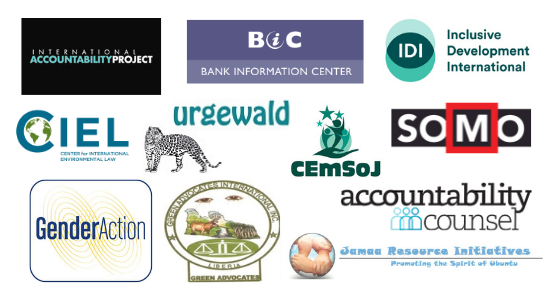New Guide For Making Accountability Mechanisms More Effective

13 December 2021 – The Good Policy Paper: Guiding Practice from the Policies of Independent Accountability Mechanisms, published today, is a roadmap for financial institutions setting up new independent accountability mechanisms (IAMs), as well as a tool for existing IAMs to evaluate the effectiveness of their current policies. The Good Policy Paper examines the policy provisions currently in place at IAMs from the perspective of communities using them to seek redress for environmental and social harm from internationally financed projects, and identifies the most effective provisions as examples for other IAMs to follow.
The Good Policy Paper is authored by Accountability Counsel, Bank Information Center, Center for International Environmental Law (CIEL), Centre for Research on Multinational Corporations (SOMO), Community Empowerment and Social Justice Network (CEMSOJ), Gender Action, Green Advocates International (Liberia), Inclusive Development International, International Accountability Project, Jamaa Resource Initiatives, and urgewald.
The authors identified 69 good policy provisions currently on the books at 19 different financial institutions, including multilateral development banks, national development finance institutions, and other financiers. To decide which provisions constitute good practice, the authors analyzed the policies of IAMs that are members of IAMNet, using the UN Guiding Principles on Business and Human Rights effectiveness criteria for grievance mechanisms and their own years of experience working alongside project-affected communities through the IAM complaints process. The good policies highlighted also reflect feedback solicited from IAMNet members in 2019.
Key recommendations include:
- An IAM should have a two-fold mandate: (1) to prevent harm and provide effective remedy to project-affected people and the environment, and (2) to ensure institutional accountability and continuous improvement for the financial institution.
- An IAM should have three functions: (1) Compliance Review, (2) Dispute Resolution, and (3) Advisory.
- Compliance review investigates a financial institution’s compliance with its own environmental and social policies and international standards. Compliance review should result in recommendations and an action plan to address non-compliance with a financial institution’s policies and redress past harms to complainants.
- Dispute resolution brings the complainants together with the financial institution’s client and other stakeholders to generate and agree on solutions and remedies for negative impacts. To be effective, the dispute resolution function must take measures to rectify power imbalances that often exist between the parties.
- Through the advisory function, the IAM provides pragmatic evidence-based recommendations gleaned from the mechanism’s compliance review and dispute resolution casework to illuminate gaps in the financial institution’s policies and their implementation.
- An IAM’s structure should maximize its impartiality, credibility, legitimacy, and independence from the financial institution’s management.
- An IAM’s scope and admissibility rules should minimize barriers to accessing the mechanism’s complaint process and allow complaints to proceed in a predictable, transparent, and effective manner.
- Financial institutions should transparently disclose information about the IAM’s procedures, operations, and cases.
The Good Policy Paper presents the minimum policy provisions of an effective IAM; the featured provisions represent a floor rather than a ceiling. As the paper explains, “Even if there were an IAM that had all of the best existing provisions, which there is not, it would still not be a model policy.” For that reason, the authors also include suggestions for making the existing policies even stronger. For example, IAMs and financial institutions can improve on existing policies by: (1) developing remedy funds to ensure resources for remedial actions; and (2) developing public policies on how financial institution staff engage with the accountability mechanism process.
The Good Policy Paper is a resource that will be updated regularly as existing IAM policies improve and new IAMs are developed. Better policies will feed back into stronger recommendations, a cycle which, the authors hope, will translate into better outcomes for communities.
Click here to read and download the Good Policy Paper: Guiding Practice from the Policies of Independent Accountability Mechanisms.

